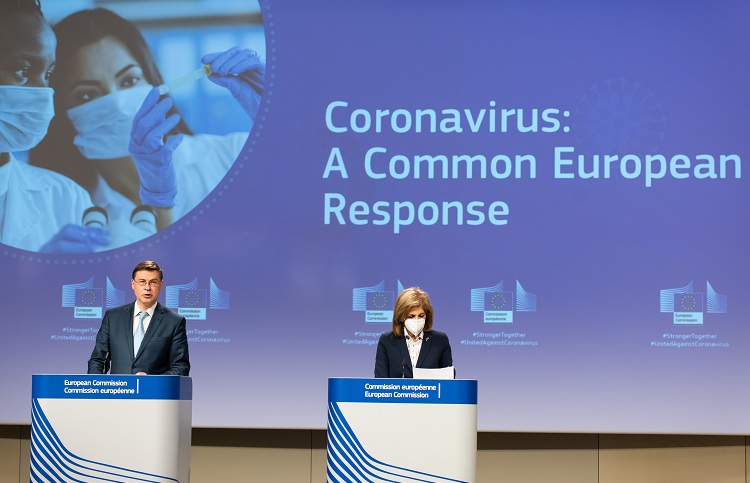Eduardo González
The European Commission yesterday strengthened the transparency and authorization mechanism for exports of COVID-19 vaccines, just 24 hours before European leaders debate the distribution of the vaccines at the European Council and amid the controversy generated by the UK’s refusal to export AstraZeneca doses produced in its British plants, including those listed in the Brussels purchase contract.
The new “transparency mechanism” (presented yesterday by the European Commission’s economic executive vice-president, Valdis Dombrovskis, and the Commissioner for Health, Stella Kyriakides) introduces the principles of “reciprocity and proportionality” as new criteria to be taken into account when authorizing vaccine exports, considering that although “this system has significantly improved the transparency of exports”, the objective “to ensure timely access to COVID-19 vaccines for EU citizens is still not met “.
Under this new regulation, which extends and renews the previous mechanism (approved at the end of January and due to expire next March 31), the “reciprocity”criterion will apply for destination countries that restrict their own exports of vaccines or their raw materials, either by law or by other means, and the “proportionality” criterion will apply when the conditions prevailing in the destination country are better or worse than those in the EU, in particular its epidemiological situation, its vaccination rate and its access to vaccines.
Under these criteria, Member States and the Commission should assess “whether the requested exports do not pose a threat to the security of supply of vaccines and their components in the Union“, said Brussels, which assured that “the EU remains committed to international solidarity and will therefore continue to exclude from this scheme vaccine supplies for humanitarian aid or destined to the 92 low and middle income countries under the COVAX Advance Market Commitment list”.
Spanish official sources indicated yesterday that the Government of Pedro Sánchez supports the new mechanism proposed by the Commission, whose objective, they specified, is to put an end to the automatic export authorizations and to introduce stricter controls based on compliance with the criteria of “reciprocity and proportionality”. They also assured that this mechanism is not directed expressly or exclusively against the United Kingdom because it also takes into account the international trade of components for the production of vaccines, which come from other third countries.
Last Monday, the Minister of Foreign Affairs, Arancha González Laya -who yesterday met in Brussels with her British counterpart, Dominc Raab, in the margins of the NATO ministerial meeting, although Foreign Affairs sources contacted by The Diplomat did not specify the content of the conversation beyond “bilateral relations, security and COVID-19 management” mentioned in the Ministry’s Twitter account-, assured that the EU measures to restrict vaccine exports “are not intended to penalize any third country but to force pharmaceutical companies to comply with their contracts with the EU”.
Since the implementation of this mechanism, 380 export requests to 33 different destinations have been granted for a total of approximately 43 million doses. Only one export application was not accepted (an AstraZeneca consignment detected in Italy when it was to be shipped to Australia). Major export destinations include the United Kingdom (with approximately 10.9 million doses), Canada (6.6 million), Japan (5.4 million), Mexico (4.4 million), Saudi Arabia (1.5 million), Singapore (1.5 million), Chile (1.5 million), Hong Kong (1.3 million), Korea (1.0 million) and Australia (1.0 million).
“While our Member States are facing the third wave of the pandemic and not every company is delivering on its contract, the EU is the only major OECD producer that continues to export vaccines at large scale to dozens of countries”, Commission President Ursula von der Leyen said yesterday. “But open roads should run in both directions. This is why the European Commission will introduce the principles of reciprocity and proportionality into the EU’s existing authorisation mechanism”, she added.





